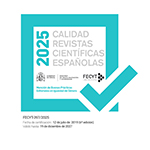Efectos de una intervención siguiendo el modelo enfocado en la familia para promover avances en el desarrollo del lenguaje de los niños
Resumen
La intervención siguiendo el modelo enfocado en la familia, como camino hacia las prácticas centradas en la familia, aprovecha las situaciones naturales de las rutinas diarias para promover el desarrollo de los niños. El estudio ha tenido como objetivo implementar y evaluar la eficacia de una intervención centrada en cuatro familias para conseguir el avance en las habilidades comunicativas de sus hijos de cinco años, medidas a través de pruebas estandarizadas de lenguaje, y de análisis de actividades comunicativas con los padres y con la investigadora. Las familias participaron en cinco reuniones donde se discutieron estrategias útiles para ayudar a los niños a superar nuevos retos comunicativos. El análisis de los datos pone de relieve que todos los niños han mejorado sus habilidades comunicativas, en todas las valoraciones. Asimismo, reflejan una vez más la importancia de la interacción comunicativa entre adultos y niños, y el potencial de una intervención siguiendo un modelo enfocado en la familia para promover avances en el desarrollo comunicativo de los niños.Descargas
Descarga artículo
Licencia
La Revista de Investigación en Logopedia, para fomentar el intercambio global del conocimiento, facilita el acceso sin restricciones a sus contenidos desde el momento de su publicación en la presente edición electrónica, y por eso es una revista de acceso abierto. Los originales publicados en esta revista son propiedad de la Universidad Complutense de Madrid y es obligatorio citar su procedencia en cualquier reproducción total o parcial. Todos los contenidos se distribuyen bajo una licencia de uso y distribución Creative Commons Reconocimiento 4.0 (CC BY 4.0). Esta circunstancia ha de hacerse constar expresamente de esta forma cuando sea necesario. Puede consultar la versión informativa y el texto legal de la licencia.












